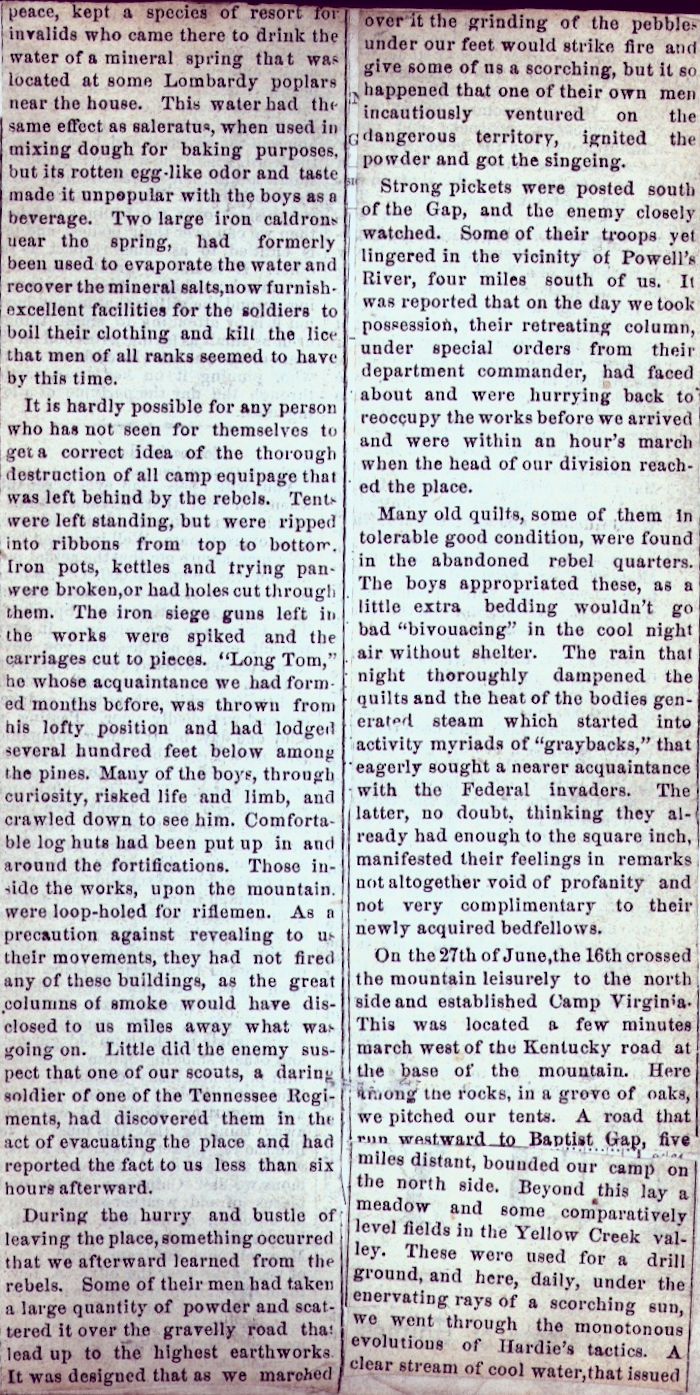| Camp & Field Page 20 | Camp & Field Index Page | 16th OVI Home Page | Camp & Field Page 22 |
The Camp & FieldArticles by Theodore Wolbach |
 Cpl. Theodore D. Wolbach |
The following image is taken from a book titled "Mortality and Statistics of the Census of 1850" in which it is believed retired Captain Rezin H. Vorhes, Company H, pasted over the pages a series of articles written by Cpl. Theodore D. Wolbach, Company E, titled "Camp and Field" and published, by chapter, in the Holmes County (Ohio) Republican newspaper from February 24, 1881 to August 17, 1882. The articles tell the story, in great detail and color, of the 16th OVI, from the inception of the 3-year regiment in October, 1861, through all its camps, battles and marches until it was disbanded on October 31, 1864. The articles pasted in the Vorhes book cover the first 35 chapters, published through October 20, 1881. All the remaining chapters were recently found in a Holmes County library by researcher Rob Garber who obtained copies, performed the transcriptions and provided to this website and which are also presented here, thus providing the complete work by Theodore Wolbach.
Throughout these articles click on the underlined white text for additional details.
The webauthor thanks 16th Ohio descendant Rob Garber for his excellent research on the Camp And Field articles and for performing the tedious digital transcription of those articles found on each page. The transcriptions were made to reflect the original articles verbatim, misspellings and all. Rob is the 3rd great nephew of Capt. William Buchanan, Company F, 16th Ohio, who served in the 90-day regiment as a private, re-enlisting in the three year regiment, and eventually making the rank of Captain of Company F. Thanks Rob!
Page 21 - Chapter 13 - June, 1862
 |
peace, kept a species of resort for invalids who came there to drink the water of a mineral spring that was located at some Lombardy poplars near the house. This water had the same effect as saleratus, when used in mixing dough for baking purposes, but its rotten egg-like odor and taste made it unpopular with the boys as a beverage. Two large iron caldrons near the spring, had formerly been used to evaporate the water and recover the mineral salts, now furnish excellent facilities for the soldiers to boil their clothing and kill the lice that men of all ranks seemed to have by this time. It is hardly possible for any person who has not seen for themselves to get a correct idea of the thorough destruction of all camp equipage that was left behind by the rebels. Tents were left standing, but were ripped into ribbons from top to bottom. Iron pots, kettles and frying pans were broken, or had holes cut through them. The iron siege guns left in the works were spiked and the carriages cut to pieces. During the hurry and bustle of leaving the place, something occurred that we afterward learned from the rebels. Some of their men had taken a large quantity of powder and scattered it over the gravelly road that lead up to the highest earthworks. It was designed that as we marched |
over it the grinding of the pebbles under our feet would strike fire and give some of us a scorching, but it so happened that one of their own men incautiously ventured on the dangerous territory, ignited the powder and got the singeing. Strong pickets were posted south of the Gap, and the enemy closely watched. Some of their troops yet lingered in the vicinity of Powell's River, four miles south of us. It was reported that on the day we took possession, their retreating column, under special orders from their department commander, had faced about and were hurrying back to reoccupy the works before we arrived and were within an hour's march when the head of our division reached the place. Many old quilts, some of them in tolerable good condition, were found in the abandoned rebel quarters. The boys appropriated these, as a little extra bedding wouldn't go bad On the 27th of June, the 16th crossed the mountain leisurely to the north side and established Camp Virginia. This was located a few minutes march west of the Kentucky road at the base of the mountain. Here among the rocks, in a grove of oaks, we pitched our tents. A road that run westward to Baptist Gap, five miles distant, bounded our camp on the north side. Beyond this lay a meadow and some comparatively level fields in the Yellow Creek valley. These were used for a drill ground, and here, daily, under the enervating rays of a scorching sun, we went through the monotonous evolutions of Hardie's tactics. A clear stream of cool water, that issued |
| Camp & Field Page 20 | Camp & Field Index Page | 16th OVI Home Page | Camp & Field Page 22 |